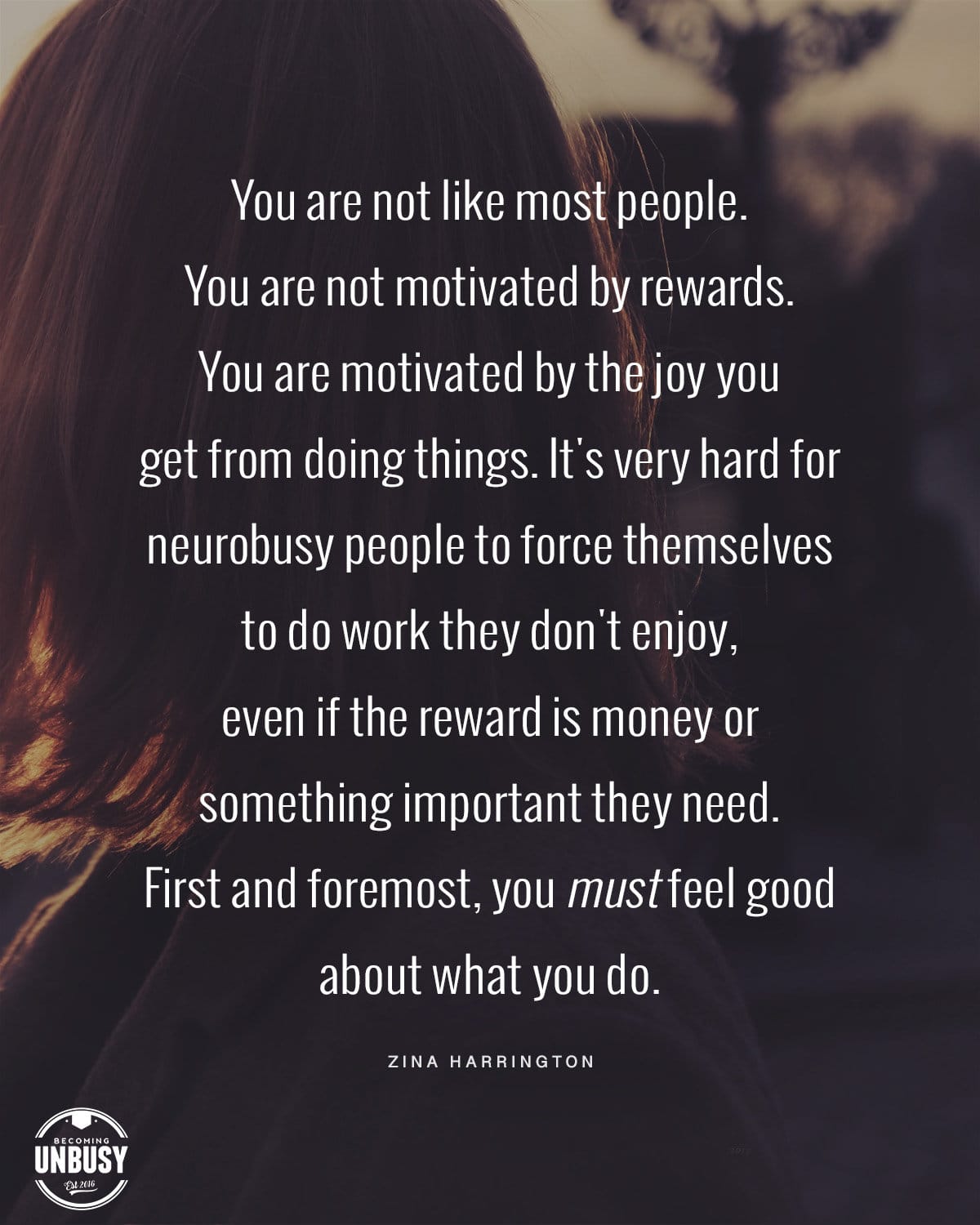Your interest-based nervous system is unique. Honor your wiring and unlock the power of your neurobusy brain with these eight effective strategies.

Have you ever found yourself completely stuck, physically unable to motivate yourself to complete an important task or project … even when you know not getting it done on time will be detrimental to yourself or someone you love?
You're so busy. You just cannot seem to get it done.
When you do have a break in the chaos, you still ignore the task.
It's just there, looming over you.
You're not alone in this, my friend.
Quite that voice inside your head saying you're a lazy procrastinator.
Task paralysis is REAL. It is a common neurobusy struggle.
Learn to honor your wiring and unlock the power of your interest-based nervous system with the eight effective strategies below!
In a rush? Jump to the section of your choice or scroll to the very bottom for a quick summary of key points!
Jump to:
Importance-Based Nervous Systems
In general, the more important a task is, the more likely a person is to find the motivation needed to complete the job. An importance-based nervous system is motivated by obligations, responsibility, rewards, and timelines.
Neurobusy brains don't always function that way.
Interest-Based Nervous Systems
Neurobusy people often have what's known as an interest-based nervous system.

Finding motivation to do things you are not interested in can be challenging when you have an interest-based nervous system.
Do you feel like you are in a constant battle with procrastination?
The Science of Dopamine
The struggle to initiate and complete mundane tasks can be exhausting, leaving you feeling overwhelmed and frustrated.
This interest-based nervous system challenge is attributed mainly to lower brain dopamine levels.
Dopamine is a neurotransmitter that plays a crucial role in motivation and is connected with feelings of happiness. Dopamine is the brain’s most intense reward.
Because of diminished dopamine levels, the neurobusy brain constantly seeks it.
With an interest-based nervous system, you're much more likely to follow through when you find something interesting because it dramatically boosts dopamine levels.
Neurobusy Hyperfocus
Struggles with attention or motivation disappear when the neurobusy brain is genuinely interested in and challenged by an activity, attracted by a unique or unusual task, or thrown into a competitive environment.
You might find yourself "in flow" or in hyperfocus multiple times during the day. This happens when the interest-based nervous system “gets in the zone," amplifying dopamine production.
The key to overcoming procrastination lies in understanding your unique neurobusy struggles and unlocking the power of interest — a force that can boost dopamine levels and motivation.
Honoring Your Wiring
Your motivation likely isn't driven by importance or "supposed to" but rather by hyperfocusing on genuine interests.
To honor your wiring, you and other people with interest-based nervous systems must find ways to make a mundane task compelling to overcome procrastination.
How To Unlock The Power Of An Interest-Based Nervous System
Explore eight effective strategies for unlocking the power of your interest-based nervous system into your daily routine to reclaim control and get things done.
01. Gamify Your Tasks
Turn everyday tasks into engaging games to make them more interesting. Set clear goals, establish rewards for completion, and challenge yourself to beat your own records. By adding an element of fun and competition, you'll find yourself more motivated to tackle even the most mundane tasks.
02. Change Your Environment
Sometimes, a change of scenery is all it takes to kickstart your motivation. Experiment with different workspaces, lighting, or seating arrangements to find the environment that resonates with you. Small changes can make a big difference in breaking the monotony and increasing your interest in the task at hand.
03. Body Doubling
Enlist the support of a friend or family member to act as a "body double" while you work. Having someone else present is a great way to outsource motivation. Even if they're working on their tasks, can create a sense of accountability and make your tasks feel less solitary. This shared energy can boost motivation and help you stay focused.
04. Time Challenges
Set specific time limits for your tasks and challenge yourself to complete them within those constraints. A sense of urgency can trigger a dopamine release, heightening your focus and motivation. Use a visual timer to create a structured and time-bound approach to your work.
05. Podcasts or Audiobooks
Combine productivity with entertainment by listening to podcasts or audiobooks while you work. Choose content that aligns with your interests or the task at hand. This multitasking approach can make mundane tasks more enjoyable and help maintain focus.
06. Music Magic
Create a playlist of your favorite tunes or explore new genres to find music that enhances your focus. The right soundtrack can stimulate dopamine release, turning a tedious task into a more enjoyable experience. Experiment with different types of music to see what resonates best with you.
07. Pair Boring Tasks With Exciting Ones
Find motivation to complete a tedious task when you pair it up with an exciting one you're interested in doing. Watch the latest episode of your favorite show only when sorting laundry. Listen to your favorite audiobook only when walking the dog. Couple the tasks up!
08. Add Movement to Your Routine
Physical activity has a profound impact on dopamine levels. Incorporate short bursts of movement into your routine, such as stretching or taking a quick walk, to revitalize your mind and body. Breaking up your work with movement can combat restlessness and enhance overall productivity.
Love this article on interest-based nervous systems? Sharing it would make our week ♥
It would make our week if you took a second to save or share this post on interest-based nervous systems. That’s how we know we’re on the right track and should continue writing more content like this!

Key Points
- An importance-based nervous system is motivated by obligations, responsibility, rewards, and timelines.
- Neurobusy people often have an interest-based nervous system, which is more likely to follow through when a person finds something interesting because it dramatically boosts diminished dopamine levels.
- Dopamine is a neurotransmitter that plays a crucial role in motivation.
- The key to overcoming procrastination lies in unlocking the power of interest, which can boost dopamine levels and motivation.
- These eight effective strategies unlock the power of an interest-based nervous system: gamification, change of environment, time challenges, exploring new tools, adding movement to a routine, and listening to music, audiobooks, or podcasts.




